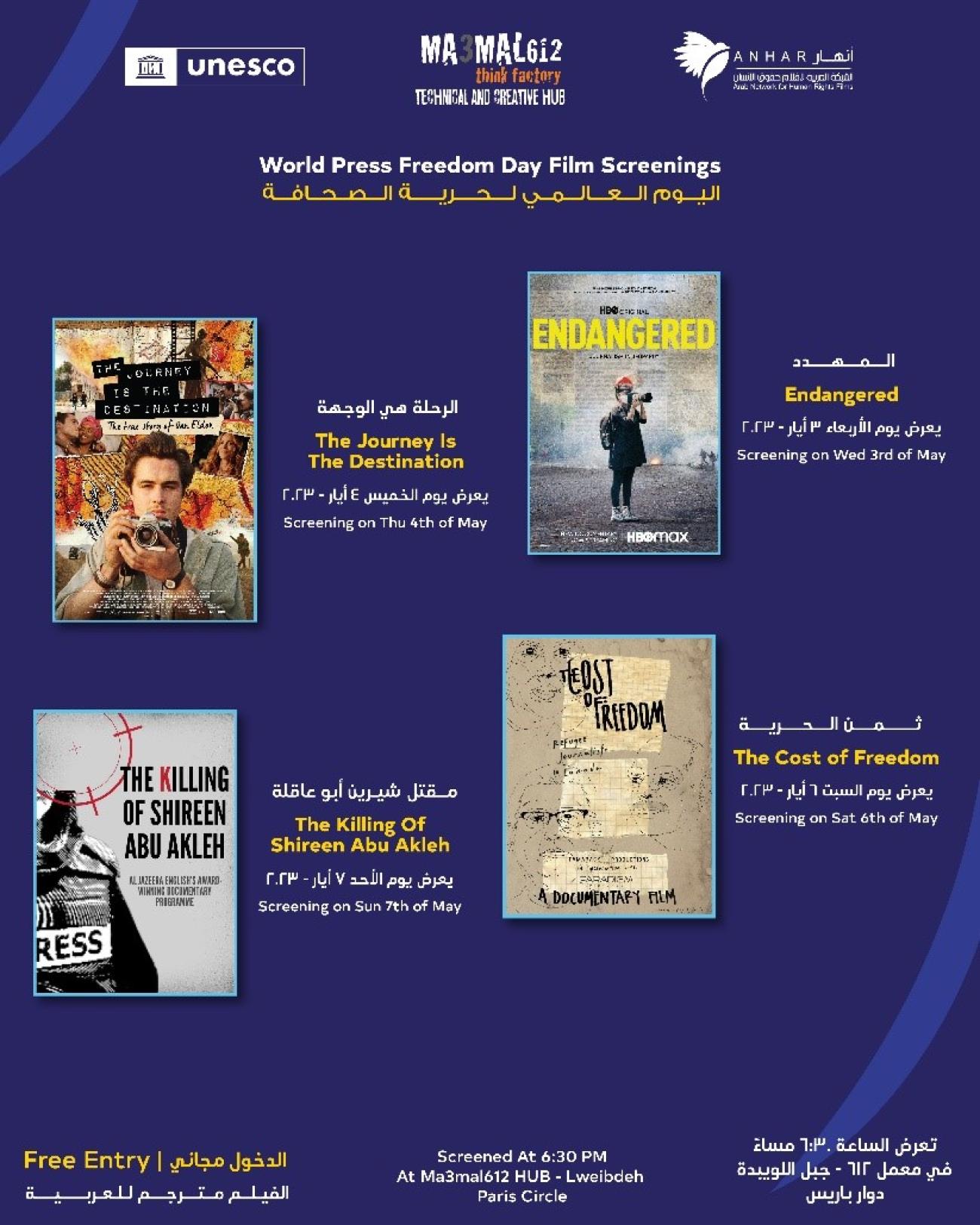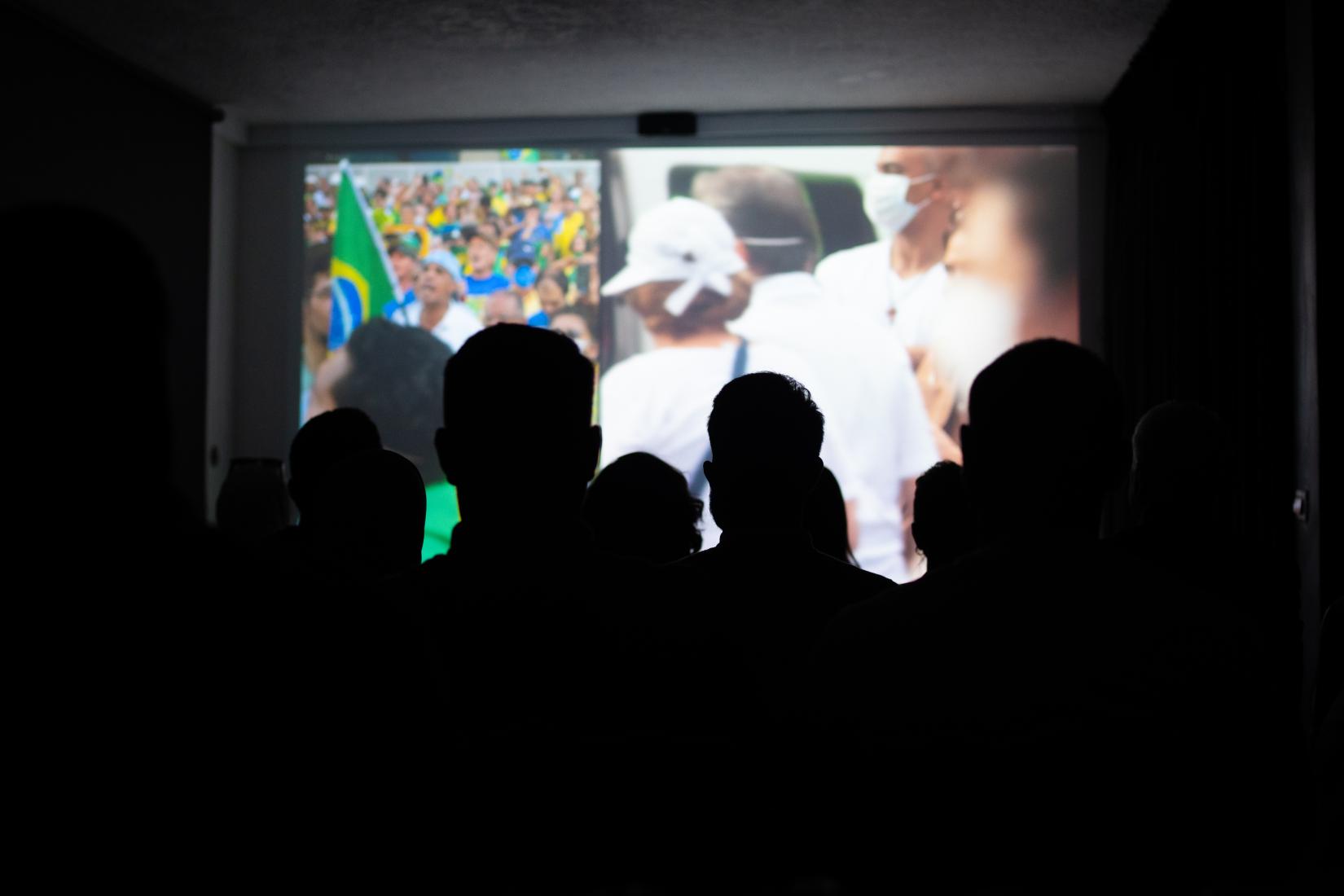Through the lens of freedom: Commemorating World Press Freedom Day in films

In the vibrant neighborhood of Lweibdeh, Jordan, a remarkable collaboration unfolded between the UNESCO Jordan office and Ma3mal612 Think Factory.
Their shared objective was to commemorate World Press Freedom Day by curating a series of thought-provoking documentaries that shed light on the significance of press freedom and the ongoing global challenges faced by journalists.
The carefully selected films were showcased over four evenings, with discussions involving journalists, filmmakers, and human rights activists. The Films covered a wide range of narratives, from international threats and intimidation to the resilience of refugee journalists rebuilding their lives.
The film series commenced with "Endangered," a gripping documentary shedding light on the immense risks and challenges that journalists endure in their pursuit of truth, fostering a deeper understanding of their vital role in society.

During the panel discussion following the first film screening, Senior producer and Journalist, Sabreen Taha, expressed her thoughts, stating, "There's a big part of the journalists' work that we don't know about—their suffering, experiences, and the challenges they face. Often, we only see the end product they produce, neglecting the profound stories behind them. There is a significant lack of coverage on this aspect, particularly in the realm of film. She emphasized that, “This event provides an invaluable opportunity to delve into the work of journalists, to understand what they encounter while pursuing stories, and to appreciate their resilience and dedication."
The second evening featured, "The Journey is the Destination" a film capturing the true story of Dan Eldon, a young activist, artist, photographer, and adventurer. Through Eldon's extraordinary journey and tragic demise, the audience experienced the profound impact that one individual can make.
"The Cost of Freedom: Refugee Journalists in Canada" took center stage on the third evening, portraying the lives of three journalists from Syria, Mexico, and Turkey. This documentary explored the reasons behind their displacement and the choices they made to rebuild their lives as refugees in Canada.
The closing night presented "The Killing of Shireen Abu Akleh," a powerful documentary recounting the tragic story of an Al Jazeera journalist who lost her life while reporting from the Jenin refugee camp. Witness accounts raised questions about the price journalists sometimes pay in their pursuit of truth, leaving a lasting impact on the audience.
Furthermore, in collaboration with Ma3mal612, UNESCO organized an intensive one-day workshop for aspiring filmmakers and screenwriters. This workshop aimed to broaden their understanding of the relationship between films and human rights, encouraging them to create compelling narratives that promote freedom of expression.
As the event concluded, the collaboration between UNESCO and Ma3mal612 proved to be a resounding success. Through the power of cinema, UNESCO and Ma3mal 612 had illuminated the challenges faced by journalists and emphasized the importance of press freedom in the realization of human rights. The impact of the event extended beyond the screenings, fostering a greater appreciation for the work of journalists and inspiring a new generation of filmmakers to amplify the voices of the unheard.
The keynote speaker, Mr. Mazen Shaquora, Regional Representative of the High Commissioner for Human Rights in the Middle East and North Africa region, passionately asserted, "The press serves as a fundamental gateway for knowledge about rights and abuses, enabling us to rectify both formal and informal injustices. Freedom of expression serves as the foundation for enjoying, promoting, and protecting other rights and freedoms. Without it, we are trapped in a phase of darkness, where minds remain closed, and our sight and vision are obscured."
Yasmin al Kiswani, one of the workshop participants, reflected on her experience, said, "This workshop has enlightened me about the interplay between journalism and filmmaking. I have come to understand the pivotal role of filmmaking in amplifying press freedom and freedom of expression as a whole. Films have the power to depict reality and serve as a catalyst for meaningful conversations."
It is worth noting that Ma3mal 612 think factory technical hub, well-known for organizing the Karama Human Rights Film Festival since 2010 and has been instrumental in promoting awareness and advocacy for freedom of expression and other human rights. Through their films, filmmaking training, and seminars, they have consistently fostered an environment that reflects the Universal Declaration of Human Rights, nurturing a deeper understanding and appreciation for fundamental rights.
Funding for this work was provided by UNESCO’s Multidonor Programme for Freedom of Expression and Safety of Journalists.

